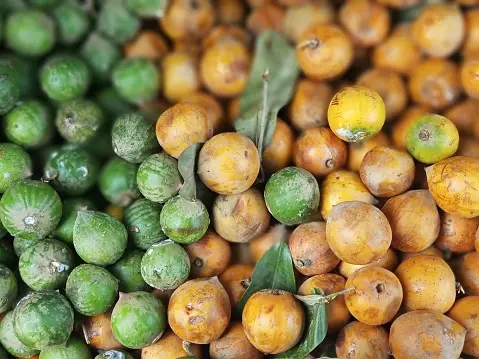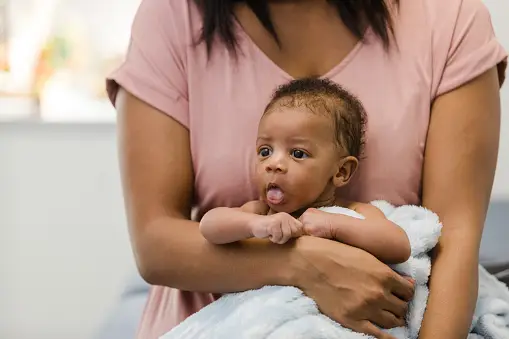Watching your baby go through various stages of development is exciting. It is common to find behavioral patterns like hiccups in this growth course. It may become a concern, especially when they appear frequently. This article will discuss hiccups, probable causes, prevention and the myths and facts surrounding it.
What are hiccups in babies?
Hiccups are sudden, uncontrollable movements of the diaphragm. The diaphragm is the muscle that separates the chest from the stomach area and plays an important role in breathing. When the stomach gets bloated, it pushes against the diaphragm, which causes it to contract. The sudden movement in the diaphragm causes the vocal cords to suddenly close, producing a "hic" sound.
The mechanism for hiccups is the same for people of all ages, young or old, but are most common in babies before and after delivery. It is one of the first habits your baby will develop, and you might also have experienced a rhythmic jerking sensation during late pregnancy. It could have been the baby hiccuping.
This continues even after they have been born, lingering repeatedly for up to 12 months. After birth, hiccups become common after feeding. This may be due to the stimulation of the nerves that causes involuntary contraction of the diaphragm.
Causes of hiccups in babies
It is unclear what causes hiccups. Some experts believe that many of the likely causes relate to feeding and can be due to the acid that rises from the stomach when the baby is overfed; other probable causes include:
- Feeding the baby too quickly.
- Swallowing a lot of air bubbles, especially while feeding.
- A normal reflex.
Is it healthy for babies to have frequent hiccups?
Hiccups are not harmful, and they usually do not hurt babies. It only becomes less frequent as babies advance in age. It is as natural as breathing. Hiccups in a newborn could be a pointer to brain formation and development. Their movement helps them learn, even when that movement comes from an involuntary respiratory function such as hiccups.
Only on rare occasions would hiccups be traced to gastroesophageal reflux disease. Hiccups can occur multiple times daily and should not last more than a few minutes. If they become consistent for hours, take your baby for a medical checkup to rule out any health issues.
Myth or Fact: Does putting strands of wool on a baby's head stop hiccups?
It is an age-long tradition passed down to quickly grab loose ends of an outfit or wrapper, draw out a thread and place it on their head when there's a hiccup. Hiccups occur in the diaphragm and only occur when there's a contraction or a quick closing of the vocal cords. Placing strands of wool or thread won't serve any purpose. It is a coincidence that a baby stops hiccuping after using a thread to line a part of their head.
Aside from placing strands of wool on a baby's head, many other myths surround it, like pulling a baby's tongue or startling the baby. There is no scientific evidence to support these theories. Do not heed such measures as they may likely cause more harm than good.
Prevention and management of hiccups in babies
Hiccups are not preventable, and it is a normal phenomenon. However, there are a few home remedies that may help. They include;
- Feed babies slowly and in small amounts: If your baby often has hiccups after feeding, try feeding them slowly.
- Regular burping: It is a good idea to burp bottle-fed babies every time they consume food, and if a baby is breastfed, take breaks during feeding to let the baby burp while switching breasts. This may help to release the trapped air in the diaphragm. However, if the baby seems unbothered and does not burp after a few minutes, resume the feeding.
- Use a pacifier: Sucking on a pacifier may help to relax the diaphragm and stop hiccupping.
- Sit them upright on your laps and rub their backs: You can place your baby across your shoulders and gently pat their back. This action can help them relax and may prevent the contraction that triggers the hiccups.
- Bottle size: If you feed your baby with a bottle, buy the right size to ensure the opening is not too wide or tiny. Try repositioning the bottle at intervals while feeding so the milk is evenly distributed and also to let out trapped air. If breastfeeding, fasten your baby's mouth well around your nipple. This is to prevent suckling in extra air.
It is pertinent to understand that these methods are not entirely reliant. It does not serve as a cure. If they are not bothering your baby, allow it to go away on its own.
Hiccups are regular occurrences. Adults might find it discomforting, but it isn't a source of worry in babies. There is no special treatment for hiccups unless an underlying disorder causes them. Be careful when using home remedies for hiccups in babies.
Remember that your baby is still too delicate. Letting the hiccups go on their own without any special care is fine. If it does not settle within minutes, causes distress, or begins to affect their sleeping routine, consult your baby's paediatrician.
Frequently Asked Questions (FAQs)
What causes hiccups in babies?
There is yet no proven cause of hiccups in babies. It is a reflex movement. However, overfeeding or feeding babies a little too fast can be a trigger.
How can I stop hiccups in my baby?
There's no permanent cure for hiccups. It is normal and only becomes less frequent as the baby ages.
How do I prevent hiccups in my baby?
It is involuntary, but taking certain measures, like not overfeeding your baby and pausing in between, may help.










Comments